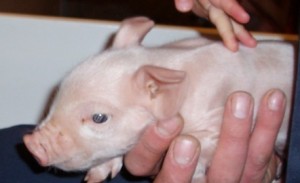
Photo courtesy BC Pork
This little piggy didn’t get to market. (I’m not talking about the one in the photo) Over the past few weeks, pork producers in Ontario have been dealing with four confirmed outbreaks of porcine epidemic diarrhoea. It’s a virus that is almost always fatal to very young piglets that get it, and the outbreaks have BC pork producers worried in case they start to spread across Canada.
This virus is very bad news. Apparently it has a 95 to 100 percent fatality rate in piglets, and we are talking very young piglets, just 2 to 5 days old. This virus started showing up in the U-S in late spring and early summer last year, and has decimated herds there, with hundreds of fatalities in Ontario already. Once the piglets are two to three weeks old they build up a natural immunity to the disease. But it is very contagious, and can be spread quite easily through feces, saliva, and can even be transmitted by humans who might get it on their clothes. But I should also say that this disease poses no threat to humans at all, or to other species, and there is also no food safety concerns to worry about with this particular disease.
Here in BC, I started with the provincial ministry of agriculture, and their communications department sent me some relevant information, such as the fact that there have not been any cases of PED diagnosed here. When the ministry got wind of the U-S outbreaks last year, it started developing greater testing facilities here, and can now offer a 24-hour turnaround time on diagnostic samples, and since PED was diagnosed in Ontario, the Animal Health Centre in Abbottsford is offering PED testing to pork producers at no charge. Ministry staff is working with other provincial and federal agencies and producers, and here’s a key point: The Ministry also has committed to support the active surveillance of B.C. abattoirs that receive pigs from outside of B.C., by providing testing at no charge.
That’s important, because if you don’t have PED here to begin with, it could be brought in on pigs coming here to be processed from other jurisdictions. We get a LOT of our pork from Alberta, it is one of the provinces that would be hit hardest by an epidemic. Geraldine Auston at BC Pork told me that she has been arranging lots of conference calls with pork producers here, and especially in Alberta because of the amount of pork that is shipped here from there, and that all of her registered producers are implementing heightened bio-security measures.
Part of those measures means being very careful about who or what comes onto your farm, monitoring the source of the feed you may bring onto the farm, and being extra careful with sanitation when you are delivering pigs to the abattoir or picking up what you’ve had processed, because even a speck of infected manure could transfer from the yard of the abattoir to the wheels of your truck, for example. I also spoke with Allen McWilliam of Tannadice Farms up in Courtenay, who has a complete change of clothing ready to go when he finishes his business at the abattoir. He says pork producers here on the Island always feel a little isolated from what happens on the mainland, but that they can’t get complacent. He’s taking part in a webinar tomorrow morning during which he expects to learn a lot more about PED…and while he thinks he may learn more, he may also be more scared by the end of the session.
It almost sounds like what many of the poultry producers went through with the avian flu outbreak a few years ago, except that in this case, humans can’t get sick from PED, but yes, preventing the spread is very important. Allen McWilliams was telling me that sometimes people would call him to say his pigs were loose, out of their barn, but he knew it wasn’t true, so he would just go back to doing whatever he was doing. Now, when he gets those calls he goes out to look for those pigs, to make sure some unknowing neighbour doesn’t decide to do him a favour and put pigs that aren’t actually his, into his barn, introducing who knows what. Both Allen and Geraldine Auston from BC Pork raised their worries about smaller pig farms not having as stringent bio-security measures that could increase the risk of disease spreading through abattoirs, but Tom Henry sees it in a slightly different light. He’s a pork producer in Metchosin who says for some smaller farmers, really rigorous biosecurity is almost not possible. He relies a lot on gleaning, using food that would otherwise be wasted in the food service or grocery industry to feed his pigs to keep costs down, so it’s hard to monitor all the food sources. All the same, he’s not going to be buying pigs from other farms to raise on his farm for a while, and will really carefully monitor the health of his piglets so they can get to that natural immunity stage.
I know this sounds weird, but there could be an upside to Vancouver Island pork producers. This kind of story helps drive more people toward purchasing local pork. Tom Henry says he is now wholesaling his pigs to local butcher shops and charcuteries and grocery stores like the Red Barn Markets, Village Butcher, Whole Beast Salumeria, Choux Choux Charcuterie, and Heather McWilliam of Tannadice Farms says they are developing new lines of pork products like wieners and liverwurst to use up all the parts of their animals, and there are more people out there willing to pay a little bit more for a local product. It’s been very difficult for BC pork produces to make a living in the shadow of much cheaper product coming in from the Prairies and the United States. Geraldine Auston told me they have pretty much hit bottom with the number of farms and farmers out of the business, but if the current farms can stay healthy, there might be a bit of a rebound.


